六年级英语过去式ppt课件
苏教牛津版小学英语六上《Unitunit1Theking-snewcloths》PPT课件

三易教育辅导讲义名词child [tʃaɪld] 孩子sentence [ˈsɛntəns]句子mountain[ˈmaʊntən]大山forest [ˈfɔrɪst]森林turn [tɚn]时机prince[prɪns]||王子princess[ˈprɪnsɪs]公主cowboy [ˈkaʊˌbɔɪ] 牛仔jean [dʒin] 牛仔裤kilt [kɪlt] 苏格兰褶裙副词hard[hɑː(r)d]努力地,费力地介词through[θru]穿过其他Miss [mɪs]小姐Mrs ['mɪsɪz] 夫人二、词组long long ago 很久很久以前turn into 变成make new clothes for you 为你做新衣try on 试穿walk through 穿行,步行穿过look after 照顾walk by 经过,路过look at 注视,看in his new clothes 穿着新衣服point at 指着wear clothes 穿衣服shout at 对……大吼in front of在……前面laugh at 对……大笑a lot of people 很多人think hard 努力思考a little boy 小男孩live in 居住在……tell a story 讲故事live with 与……一起生活On the mountain 在大山上in the street 在街道上be happy/sick 开心/生病三、语法(一)过去时态Long long ago,there was a king.He liked new clothes.很久很久以前,有一个国||王,他喜欢新衣服.There were a lot of people in the street.街道上有许多人.1、概念一般过去时,表示过去某个时间里发生的非持续性动作或存在的状态、习惯、事物,也表示过去经常或反复发生的动作,格言本来用过去时者不可改变其时态.2、一般过去时的用法:1.过去发生的动作.例如:The police stopped me on my way home last night.We worked Did we work? We did not work Did we not work? You worked Did you work? You did not work Did you not work?They worked Did they work? They did notworkDid they not work?4、动词原型变为过去式(二)特殊句式1、Show sb. sth. =show sth. to sb.向某人展示某事物The two men showed the king his new clothes.=2、Tell sb.sth. =tell sth. to sb.告诉某人某事The old man told the boy a story.=3、Give sb.sth. =give sth. to sb.给某人某物You picked a flower. Now give me your child.=4.sb . have to do sth.不得不做某事We have to start the story again.四、音标‘ar ,发音[a:]课本:arm ,card , hard ,park ,party补充:car , cartoon ,far ,farm ,star ,jar,garden,yard三、课后作业一、单词辨音,判断读音是否相同,相同的打"√ 〞,不同的打"×〞1.long point ( ) 2. laugh afternoon ( )3. arm art ( )4. start hard ( )5. flower show ( )6. shout house ( )五、教师评定:1、学生上次作业评价:○好○较好○一般○差2、学生本次上课情况评价:○好○较好○一般○差教师签字:家长签字:___________三易教育教务处。
小学六年级英语复习——过去式

The little boy jumped up and down in the park.(小男孩在公园里跳上跳下。)
walk的过去式是walked,例句
We walked to school instead of taking the bus.(我们步行去学校,没有坐公交车。)
过去进行时
表示在过去某一时刻正在进行的动作或状态。如“We were playing football at that time”(那时我们正在踢足球)中的“were playing”就是过去进行时。
过去完成时
表示在过去某一时间之前已经完成的动作或状态。如“They had finished their homework”(他们已经完成了作业)中的“had finished”就是过去完成时。
行为类动词过去式及例句
listen的过去式是 listen…
I listened to the radio while I was driving.(我开车时听广播。)
read的过去式是read ,例句
He read a book about science last week.(上周他读了一本关于科学的 书。)
一般过去时
表示过去某个时间发生的动作或状 态
过去进行时
表示过去某个时间正在进行的动作 或状态
过去完成时
表示过去某个时间之前已经完成的 动作或状态
过去完成进行时
表示过去某个时间之前一直在进行 的动作或状态
05
小学六年级常见过去式及例句
吃喝类动词过去式及例句
eat的过去式…
I ate a big dinner yesterday.( 我昨天吃了一顿丰盛的晚餐。)
六年级下册英语第六模块的课文每个的过去式
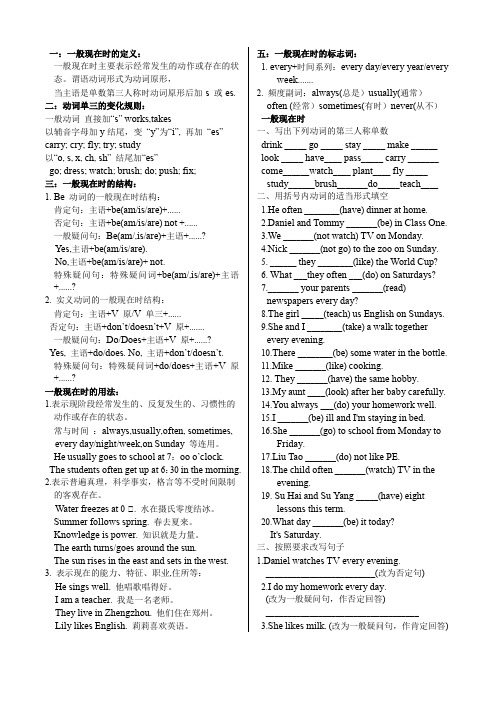
一:一般现在时的定义:一般现在时主要表示经常发生的动作或存在的状态。
谓语动词形式为动词原形,当主语是单数第三人称时动词原形后加-s或-es.二:动词单三的变化规则:一般动词直接加“s” works,takes以辅音字母加y结尾,变“y”为“i”, 再加“es” carry; cry; fly; try; study以“o, s, x, ch, sh” 结尾加“es”go; dress; watch; brush; do; push; fix;三:一般现在时的结构:1. Be动词的一般现在时结构:肯定句:主语+be(am/is/are)+......否定句:主语+be(am/is/are) not +......一般疑问句:Be(am/,is/are)+主语+......?Yes,主语+be(am/is/are).No,主语+be(am/is/are)+ not.特殊疑问句:特殊疑问词+be(am/,is/are)+主语+......?2. 实义动词的一般现在时结构:肯定句:主语+V原/V单三+......否定句:主语+don’t/doesn’t+V原+.......一般疑问句:Do/Does+主语+V原+......? Yes, 主语+do/does. No, 主语+don’t/doesn’t.特殊疑问句:特殊疑问词+do/does+主语+V原+......?一般现在时的用法:1.表示现阶段经常发生的、反复发生的、习惯性的动作或存在的状态。
常与时间:always,usually,often, sometimes, every day/night/week,on Sunday等连用。
He usually goes to school at 7:oo o’clock. The students often get up at 6:30 in the morning.2.表示普遍真理,科学事实,格言等不受时间限制的客观存在。
新牛津译林苏教版六年级英语上册Unit 2 What a day第二课时优质公开课课件.ppt
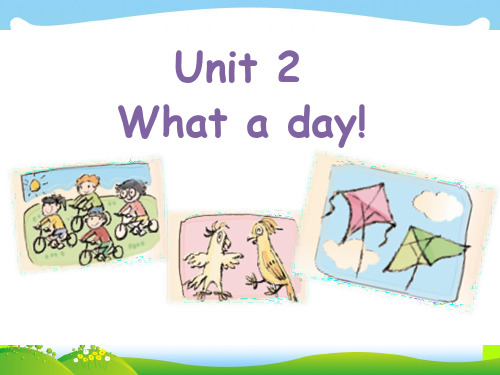
Unit 2 What a day! Yang Ling’s diary:
Try to recite Yang Ling’s diary!
Unit 2 What a day!
Magic cards
• 13、志不立,天下无可成之事。2020/8/142020/8/142020/8/142020/8/148/14/2020
• 14、Thank you very much for taking me with you on that splendid outing to London. It was the first time that I had seen the Tower or any of the other famous sights. If I'd gone alone, I couldn't have seen nearly as much, because I wouldn't have known my way about.
Unit 2 What a day!
It was … I … in the …
Unit 2 What a day!
It was … I … in the …
Unit 2 What a day!
It was … I … in the …
Unit 2 What a day!
It was … I … in the …
1. 今天上午天气晴朗。 It was sunny in the morning.
2. 天空中有许多乌云。 There are a lot of black clouds in the sky.
译林版六年级上册英语全册课件

F: Long long ago, there was a mountain.
反应快
Sam is quick.
S: There was a house on the mountain. F: Great, Sam!
Willy says the next sentence. W: An old man and a little boy lived in the house. F: Wonderful, Willy!
happy
The king
liked new clothes
.
They
looked at the king
and
shouted .
A little boy pointed at the king and laughed .
1
Long long ago, there was a king. He liked new clothes. One day, two men visited the king. “My king, we can make new clothes
译林版六年级上册
英 语
全册优质课件
学习目标:
1.介绍be动词过去式的构成。 2.引入规则动词过去式的构成。 3.会用日常用语。
Where were you yesterday, Mike?
你昨天哪里?
What did you do?
你干了什么?
I was at home.
I watched TV.
showed
clever foolish
?
Miss Fox Sam Willy
Who are they?
小学六年级英语语法总复习PPT课件

• 小学阶段不规则动词全表
• Infinitive Past tense Infinitive
• 1. am, is
was
2. keep
• 3.are
were
5. make made
4.become
7. blow
blew
8. read
• 9. buy
bought
10. ride
• 11. catch caught
fly-flying walk-walking
jump-jumping sleep-sleeping
climb-climbing fight-fighting
swing-swinging drink-drinking catch-catching pick-picking
watch-watching play-playing
dance danced
变y为 i+ed
study studied
动词的过去式(不规则)
go-went read-read eat-ate sing-sang take-took buy-bought see-saw swim-swam am,is-was do-did are-were have-had get-got leave-left fly-flew stop-stopped(双写)
.
• 一般现在时的变化
1. be动词的变化。
否定句:主语+ be + not +其它。 如:He is not a worker.他不是工人 一般疑问句:Be +主语+其它。 如:-Are you a student? -Yes. I am. / No, I‘m not. 特殊疑问句:疑问词+一般疑问句。如:Where is my bike?
人教版六年级英语下册《Where did you go》ppt教学课件

--_______________________________.
( B )2.--Where did you go?
A.I went to the park.
--___________________________.
B. I am going to ride a bike.
A.I go to the park. B. I went to the park. C. I'm going to the park. ( C )3.I ________ a bike last Saturday.
Expand
小红帽
小红帽是一个可爱的女孩。她喜欢红帽子,于是 她妈妈就叫她小红帽。
她的祖母很爱小红帽,但现在她生病了。小红帽 的妈妈非常忙,所以她让小红帽去看望祖母。在森林 里,一只狼看见了小红帽。“瞧啊!小红帽。午餐有 小孩子可以吃啦!这是一条去她祖母家的路。” 狼来 到了祖母家并吃掉了祖母。然后他戴上祖母的眼镜, 并穿上祖母的衣服并睡在祖母的床上。
B.ride B.went
C.did C.was
(A)5.A.fall
B.could C.saw
Exercise
单项选择
( A )1.Where did you_________ last Saturday? ( C)4.--What did you do there?
A. go B.goes C. went
feel hurt 感到不快;
Expressions
Where did you go last Saturday? 你上周六去哪儿了?
由where引导的特殊疑问句,用作疑问副词, 在(往、从)哪里, 在什么地方。 eg: Where are you? 你在哪儿?
小学英语教科版六年级上(第81页)过去式
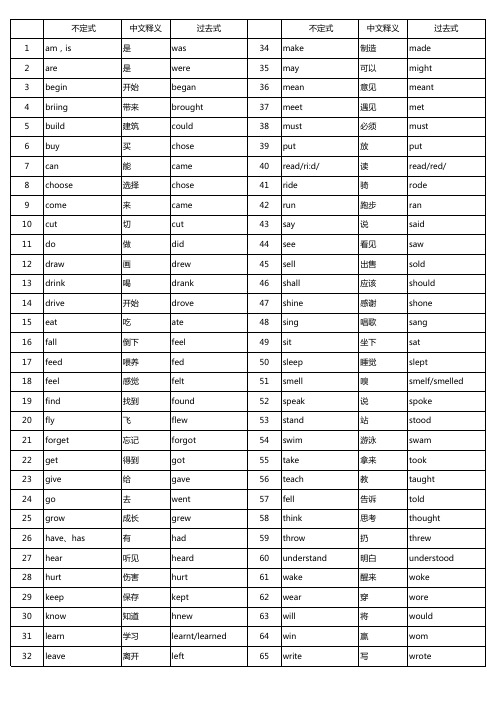
不定式 33 let
中文释义 让 let
过去式 66 catch
不定式
中文释义 抓住
过去式 caught
中文释义 是 是 开始 带来 建筑 买 能 选择 来 切 做 画 喝 开始 吃 倒下 喂养 感觉 找到 飞 忘记 得到 给 去 成长 有 听见 伤害 保存 知道 学习 离开 was were began
Hale Waihona Puke 过去式 34 35 36 37 38 39 40 41 42 43 44 45 46 47 48 49 50 51 52 53 54 55 56 57 58 59 60 61 62 63 64 65 make may mean meet must put
不定式 1 2 3 4 5 6 7 8 9 10 11 12 13 14 15 16 17 18 19 20 21 22 23 24 25 26 27 28 29 30 31 32 am,is are begin briing build buy can choose come cut do draw drink drive eat fall feed feel find fly forget get give go grow have、has hear hurt keep know learn leave
read/ri:d/ ride run say see sell shall shine sing sit sleep smell speak stand swim take teach fell think throw understand wake wear will win write
read/red/ rode ran said saw sold should shone sang sat slept smelf/smelled spoke stood swam took taught told thought threw understood woke wore would wom wrote
小学六年级下册英语小升初时态课件(通用版) 一般过去时总复习2

4.疑问was/were调句首
• Were you at home the day before yesterday﹖ • Was she happy this morning﹖
肯定回答 Yes, 主语+was/were. 否定回答 No, 主语+wasn't/weren't. Were Xiao Qiang and Xiao Long here just now﹖
• yesterday或以其构成的短语: • yesterday morning • yesterday afternoon • yesterday evening • the day before yesterday
three days ago
Miss Zhu went to Tiantian Market three days ago.
其他家族
Long long ago
yesterday Now
一般过去时 yesterday ago just now in the old days in those days in 1980 the other day at that time once upon a time
一般将来时
现在 进行
• 现在学过的常用的表示过去的时间状语有: just now,a moment ago,yesterday,last week,last night, last weekend,last year,last month,three days ago,two weeks ago,five years ago…
• (3)末尾只有一个元音字母和一个辅音字母的重读闭音节,应 双写末尾的辅音字母,再加-ed,如:stop-stopped, shop-
上海教育版六年级上册英语《Growing up》PPT教学课件(第1课时)

In this photo, my____ In this photo, my____ He/ She was________ He/ She was________ His /Her___________ His /Her___________
Justin: Mum, where are you?
小贾斯廷在河里出生。(这时)是春天。他很小并且很黑。 他看看四周。他不能找到他妈妈。 贾斯廷:妈妈,你在哪里?
Soon he has a round head and a long tail. He meets a fish in the river. She also has a round head and a long tail.
例句:我的语文老师30岁。 My Chinese teacher is thirty years old.
Look and learn
cute
可爱的
handsome
英俊的;帅气的
pretty
漂亮的
Read a story
Little Justin was born in the river. It is spring. He is small and black. He looks around. He cannot find his mum.
在照片2中,萨莉一岁。她 的头发很短,她的眼睛很大。
In Photo 3, Sally was about six years old. She was a primary school student.
六年级英语过去式表

六年级英语过去式表am/is---was are---were write----wrotebegin----began buy---bought win----wonbring---brought catch----caught come---came cut---cut can---could teach----taughtdo(does)---did drink---drank draw---drewdrive---drove eat---ate feel----feltfind---found fly---flew forget---forgotget---got go---went give---gavegrow---grew have----had hear---heardhurt----hurt keep----kept know----knewleave----left let----let lose----lostlie----lay make----made meet----metput----put read----read ride----rodering-----rang run----ran say---saidsleep---slept see----saw sell----soldshow----showed sit-----sat sing----sing understand-----understood speak-----spoke stand-----stood steal----stole swim----swam take---tooktell-----told think-----thought wear---woream/is---was are---were write----wrotebegin----began buy---bought win----wonbring---brought catch----caught come---came cut---cut can---could teach----taughtdo(does)---did drink---drank draw---drewdrive---drove eat---ate feel----feltfind---found fly---flew forget---forgotget---got go---went give---gavegrow---grew have----had hear---heardhurt----hurt keep----kept know----knewleave----left let----let lose----lostlie----lay make----made meet----metput----put read----read ride----rodering-----rang run----ran say---saidsleep---slept see----saw sell----soldshow----showed sit-----sat sing----sing understand-----understood speak-----spokestand-----stood steal----stole swim----swamtake---took tell-----told think-----thought wear---wore。
外研版三起点六年级英语下册Module6Unit1名师课件ppt

Read and answer.
1. It’s for Daming. Why? _It_w_a_s_D__am__in_g_’_s _b_ir_th_d_a_y_y_e_s_te_rd_a_y_._ 2. What is the book about? _It_w_a_s_a__bo_o_k__ab_o_u_t_s_p_ac_e_t_r_av_e_l_. ___
It was a book about space travel. Daming is very interested in space travel. He loves the present very much. Daming showed Simon his birthday present. Simon was interested in the book too. Daming asked him to read the book with him.
It _w_a_s_ a book _a_b_o_u_t_ space travel. Simon w__a_s _in_t_e_re_s_t_e_d _i_n_ the book too.
Let’s practice
It __w_a_s_ Meimei’s birthday yesterday. Her mum bought _h_e_r_a__n_e_w_b_i_k_e_.
It was a book _a_b_o_u_t football. Dongdong _w_a_s_ _in_t_e_re_s_t_e_d_ __in_ the book too.
1 _O_n_S_a_m_’_s _bi_rt_h_d_ay_,_L_in_g_li_ng__bo_u_g_h_t_h_im__a_p_re_s_en_t_._It_w_a_s_a_r_ed__pe_n_.______ 2 _O_n_L_i_ng_l_in_g_’s_b_ir_th_d_a_y_, D_a_m__in_g_b_o_u_gh_t_h_e_r_a_p_re_s_en_t_. _It_w_a_s_a_g_re_e_n_k_it_e_. __ 3 _O_n_D_a_m__in_g_’s_b_ir_th_d_a_y,_A_m__y _b_ou_g_h_t_h_im__a_p_re_s_e_nt_._It_w_a_s_a_b_lu_e_c_a_r.______ 4 _O_n_A__m_y_’s_b_ir_th_d_a_y,_S_a_m__bo_u_g_h_t_h_er_a_p_r_e_se_n_t._I_t w__as_a_n_o_r_a_ng_e_c_a_p_. _____
小升初 六年级英语语法 一般过去时 动词过去式 课件ppt

3.They _____ in the USA last year.They _____ in China
now.
A.are ; were B.were ; are
C.was ; are
D.were ; was
Listen carefully
4. 实意动词过去式的变化规则
I walk to school every day.
一起练练吧
写出下列动词的过去式
like -- ______
do -- ______
dry -- ______
drop -- ______
think -- ______
know -- ______
sit -- ______
sleep -- ______
Listen carefully
一起练练吧
用动词的适当形式填空。 1)I _____ (have) an interesting party last weekend. 2)He _____ (watch) TV and _____ (read) a useful book yesterday. 3)They all _____ (go) to the mountains yesterday morning. 4)His father _____ (be) a taxi driver five years ago. 5)I _____ (take) some pictures yesterday.
我们就不:listen -- listened open -- opened visit -- visited
Listen carefully
口 诀:
• 过去式很简单,前提必须是动词 • 结尾有e只加d • 辅y结尾也不难,把y变i加ed • 末尾双写有哪些,辅音元音辅音记 • 其他动词很随和,带上ed成过去
六年级英语上册Unit1Growingup(第1课时) ppt课件
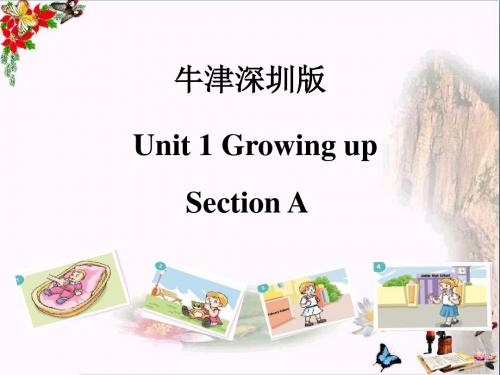
85.每一年,我都更加相信生命的浪费是在于:我们没有献出爱,我们没有使用力量,我们表现出自私的谨慎,不去冒险,避开痛苦,也失去了快乐。――[约翰· B· 塔布] 86.微笑,昂首阔步,作深呼吸,嘴里哼着歌儿。倘使你不会唱歌,吹吹口哨或用鼻子哼一哼也可。如此一来,你想让自己烦恼都不可能。――[戴尔· 卡内基] 87.当一切毫无希望时,我看着切石工人在他的石头上,敲击了上百次,而不见任何裂痕出现。但在第一百零一次时,石头被劈成两半。我体会到,并非那一击,而是前面的敲打使它裂开。――[贾柯· 瑞斯] 88.每个意念都是一场祈祷。――[詹姆士· 雷德非] 89.虚荣心很难说是一种恶行,然而一切恶行都围绕虚荣心而生,都不过是满足虚荣心的手段。――[柏格森] 90.习惯正一天天地把我们的生命变成某种定型的化石,我们的心灵正在失去自由,成为平静而没有激情的时间之流的奴隶。――[托尔斯泰] 91.要及时把握梦想,因为梦想一死,生命就如一只羽翼受创的小鸟,无法飞翔。――[兰斯顿· 休斯] 92.生活的艺术较像角力的艺术,而较不像跳舞的艺术;最重要的是:站稳脚步,为无法预见的攻击做准备。――[玛科斯· 奥雷利阿斯] 93.在安详静谧的大自然里,确实还有些使人烦恼.怀疑.感到压迫的事。请你看看蔚蓝的天空和闪烁的星星吧!你的心将会平静下来。[约翰· 纳森· 爱德瓦兹] 94.对一个适度工作的人而言,快乐来自于工作,有如花朵结果前拥有彩色的花瓣。――[约翰· 拉斯金] 95.没有比时间更容易浪费的,同时没有比时间更珍贵的了,因为没有时间我们几乎无法做任何事。――[威廉· 班] 96.人生真正的欢欣,就是在于你自认正在为一个伟大目标运用自己;而不是源于独自发光.自私渺小的忧烦躯壳,只知抱怨世界无法带给你快乐。――[萧伯纳] 97.有三个人是我的朋友爱我的人.恨我的人.以及对我冷漠的人。 爱我的人教我温柔;恨我的人教我谨慎;对我冷漠的人教我自立。――[J·E·丁格] 98.过去的事已经一去不复返。聪明的人是考虑现在和未来,根本无暇去想过去的事。――[英国哲学家培根] 99.真正的发现之旅不只是为了寻找全新的景色,也为了拥有全新的眼光。――[马塞尔· 普劳斯特] 100.这个世界总是充满美好的事物,然而能看到这些美好事物的人,事实上是少之又少。――[罗丹] 101.称赞不但对人的感情,而且对人的理智也发生巨大的作用,在这种令人愉快的影响之下,我觉得更加聪明了,各种想法,以异常的速度接连涌入我的脑际。――[托尔斯泰] 102.人生过程的景观一直在变化,向前跨进,就看到与初始不同的景观,再上前去,又是另一番新的气候――。[叔本华] 103.为何我们如此汲汲于名利,如果一个人和他的同伴保持不一样的速度,或许他耳中听到的是不同的旋律,让他随他所听到的旋律走,无论快慢或远近。――[梭罗] 104.我们最容易不吝惜的是时间,而我们应该最担心的也是时间;因为没有时间的话,我们在世界上什么也不能做。――[威廉· 彭] 105.人类的悲剧,就是想延长自己的寿命。我们往往只憧憬地平线那端的神奇【违禁词,被屏蔽】,而忘了去欣赏今天窗外正在盛开的玫瑰花。――[戴尔· 卡内基] 106.休息并非无所事事,夏日炎炎时躺在树底下的草地,听着潺潺的水声,看着飘过的白云,亦非浪费时间。――[约翰· 罗伯克] 107.没有人会只因年龄而衰老,我们是因放弃我们的理想而衰老。年龄会使皮肤老化,而放弃热情却会使灵魂老化。――[撒母耳· 厄尔曼] 108.快乐和智能的区别在于:自认最快乐的人实际上就是最快乐的,但自认为最明智的人一般而言却是最愚蠢的。――[卡雷贝· C· 科尔顿] 109.每个人皆有连自己都不清楚的潜在能力。无论是谁,在千钧一发之际,往往能轻易解决从前认为极不可能解决的事。――[戴尔· 卡内基] 110.每天安静地坐十五分钟· 倾听你的气息,感觉它,感觉你自己,并且试着什么都不想。――[艾瑞克· 佛洛姆] 111.你知道何谓沮丧---就是你用一辈子工夫,在公司或任何领域里往上攀爬,却在抵达最高处的同时,发现自己爬错了墙头。--[坎伯] 112.「伟大」这个名词未必非出现在规模很大的事情不可;生活中微小之处,照样可以伟大。――[布鲁克斯] 113.人生的目的有二:先是获得你想要的;然后是享受你所获得的。只有最明智的人类做到第二点。――[罗根· 皮沙尔· 史密斯] 114.要经常听.时常想.时时学习,才是真正的生活方式。对任何事既不抱希望,也不肯学习的人,没有生存的资格。 ――[阿萨· 赫尔帕斯爵士] 115.旅行的精神在于其自由,完全能够随心所欲地去思考.去感觉.去行动的自由。――[威廉· 海兹利特] 116.昨天是张退票的支票,明天是张信用卡,只有今天才是现金;要善加利用。――[凯· 里昂] 117.所有的财富都是建立在健康之上。浪费金钱是愚蠢的事,浪费健康则是二级的谋杀罪。――[B·C·福比斯] 118.明知不可而为之的干劲可能会加速走向油尽灯枯的境地,努力挑战自己的极限固然是令人激奋的经验,但适度的休息绝不可少,否则迟早会崩溃。――[迈可· 汉默] 119.进步不是一条笔直的过程,而是螺旋形的路径,时而前进,时而折回,停滞后又前进,有失有得,有付出也有收获。――[奥古斯汀] 120.无论那个时代,能量之所以能够带来奇迹,主要源于一股活力,而活力的核心元素乃是意志。无论何处,活力皆是所谓“人格力量”的原动力,也是让一切伟大行动得以持续的力量。――[史迈尔斯] 121.有两种人是没有什么价值可言的:一种人无法做被吩咐去做的事,另一种人只能做被吩咐去做的事。――[C·H·K·寇蒂斯] 122.对于不会利用机会的人而言,机会就像波浪般奔向茫茫的大海,或是成为不会孵化的蛋。――[乔治桑] 123.未来不是固定在那里等你趋近的,而是要靠你创造。未来的路不会静待被发现,而是需要开拓,开路的过程,便同时改变了你和未来。――[约翰· 夏尔] 124.一个人的年纪就像他的鞋子的大小那样不重要。如果他对生活的兴趣不受到伤害,如果他很慈悲,如果时间使他成熟而没有了偏见。――[道格拉斯· 米尔多] 125.大凡宇宙万物,都存在着正、反两面,所以要养成由后面.里面,甚至是由相反的一面,来观看事物的态度――。[老子] 126.在寒冷中颤抖过的人倍觉太阳的温暖,经历过各种人生烦恼的人,才懂得生命的珍贵。――[怀特曼] 127.一般的伟人总是让身边的人感到渺小;但真正的伟人却能让身边的人认为自己很伟大。――[G.K.Chesteron] 128.医生知道的事如此的少,他们的收费却是如此的高。――[马克吐温] 129.问题不在于:一个人能够轻蔑、藐视或批评什么,而是在于:他能够喜爱、看重以及欣赏什么。――[约翰· 鲁斯金]
小学英语过去式复习(课件)通用版英语六年级下册(1)

Fill in the blanks.(用所给动词的适当形式填空)
1. I __w_a_tc_h_e_d_(watch) a programme about dogs last night. 2. Jiang Yangyang___re_a_d____(read) English book last weekend. 3. Fei Xinyi ___d_a_n_ce_d__(dance) 2 years ago. 4. Wang Donghao__s_w_a_m____(swim) in the past . 5. Xiao Qing didn’t __d_o____(do) his homework yesterday.
Listen and find. Daming and his father went to the Great Wall at the weekend. They went to Badaling by bus. They arrived there at ten o’clock in the morning. The wall is very old and very long. They walked on the wall for one hour. There were lots of people. They took photos of mountains with beautiful flowers and green plants. Daming took a photo of his father.
see-__sa_w____ have-__h_a_d____ eat-_a_t_e____
规
直接加ed
play-_p_l_a_y_e_d__ watch-_w_a_t_c_h_e_d_ clean-_c_le_a_n_e_d__
六年级下册英语课件-总复习第一篇温故知新第26课时 六年级下册 Unit 2 人教(PEP)(共11张PPT)

子
afternoon and watched TV. 我和你奶奶待在家里。我们喝了下午
茶,还看了电视。
续表
3. A:Did you do anything else? 你还做了其他什么事吗?
B:Yes, I cleaned my room and washed my clothes. 是的,我打
扫了房间,还洗了衣服。
三、Read, choose and fill.阅读下面短文,根据上下文选词填空,使短文通 顺、完整。
slept,was,from,stayed,trip,big,quiet,read,restaurant,tasted
Last Saturday, I went on a 1. _t_r_ip__ with my family. We 2. _st_a_y_e_dat a hotel because it was very late. The hotel was far 3. _f_r_o_m_ the downtown. It was very 4. __q_u_i_e.t The room was 5. __b_ig__ and the beds are big, too. There 6. _w__a_s_ a big sofa at the corner. I sat on it and 7. _r_e_a_d_ a storybook. It was very comfortable. We felt hungry. Then we went to a 8. _r_e_st_a_u_r_a_n_t_ next to the hotel. The food there 9. _ta_s_t_e_d very good. After the big meal, we went to bed early. We 10. _s_le_p_t_ very well.
小学英语六年级动词ppt课件
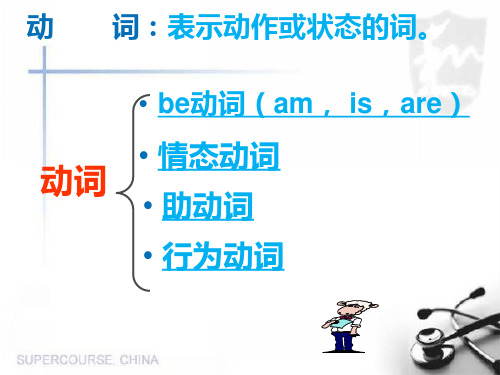
一般过去时:did
I don’t like English.
填空
1
1、 Do you like this magazine? 2、-What doesshe do at the weekends?
-She usually plays games with her friends.
注意:
(1)在一般现在时中,does用于第三人称 单数,其余一律用助动词do。
(2)助动词do,does,did后用动词原形。
为深入学习习近平新时代中国特色社 会主义 思想和 党的十 九大精 神,贯彻 全国教 育大会 精神,充 分发挥 中小学 图书室 育人功 能
助动词do
根据时态、主语人称、数的变化, do/ does/ did,
行为动词又称实义动词,表示动 作和状态
He speaksEnglish very well. 他英语讲得很好。
动词的基本形式 为深入学习习近平新时代中国特色社会主义思想和党的十九大精神,贯彻全国教育大会精神,充分发挥中小学图书室育人功能
原形 第三人称单数形式+s/es 现在分词+ing 过去式+ed
动 词:表示动作或状态的词。
• be动词(am, is,are)
动词 • 情态动词
• 助动词 • 行为动词
be动词 be动词:am,is,are, was, were be动词的否定形式: am not(没有缩略形式) are not=aren’t ,is not=isn’t 主语第一人称+am 主语第二人称+are 单数+is;复数+are
第三人称单数形式的变化
小学英语六年级下册-动词过去式ppt课件
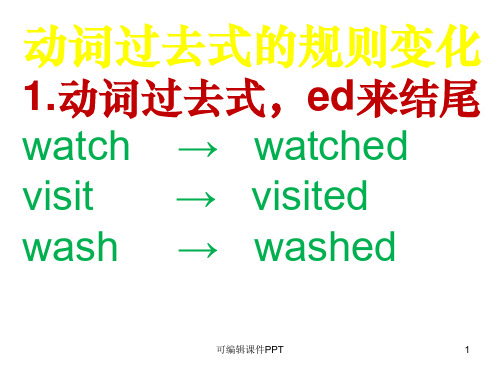
给 swim
游泳 feel 感觉 sleep
睡觉
came got
bought caught
stood rode drove woke began gave swam
felt slept
become 变成 forget
became forgot
原谅 think
thought
认为 teach
taught
教 understand understood
明白 write
wrote
写 speak
spoke
说话
drink 喝 sing 唱 sit 坐 keep 保管 sweep
可编辑扫课件地PPT
drank sang sat kept swept
7
verb Past tense
verb Past tense
stop
双写+ed
pat
↓ ↓↓
辅音 元音 辅音
pat → patted
stop → stopped
可编辑课件PPT
3
4.辅y为结尾时,变y为i加ed
辅音+y study → studied
cry → cried
可编辑课件PPT
4
一· 字母“ i ”变成“ a ”
开始 begin
began
喝 drink
cut put
had went said won dug
fell ran made
cut put
8
verb 喂 feed 飞 fly 吹 blow
知道 throw
Past tense fed flew
blew
threw
译林版(三起)英语六年级上册 Unit 2 复习课件PPT
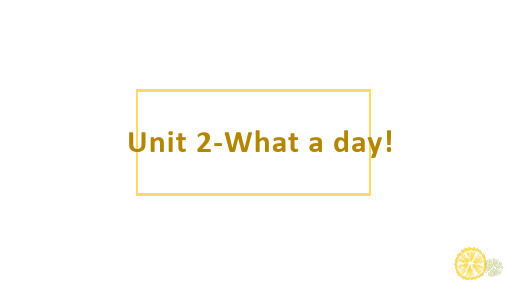
Story time
• We brought some dumplings,some bread and honey and some drinks.
• 我们带了一些饺子、面包、蜂蜜和一些饮料。 • bring-brough • bread以及honey不可数
Story time
• We saw some ants on the bread and honey. • 我们在面包和蜂蜜上看到了一些蚂蚁 • see-saw • There were some bees too. • 也有一些蜜蜂 • are-were
Words
• lose丢失 • 过去式lost • I lost some money. • 我丢了一些钱。 • know知道 • I know.我知道 • I do not know. • 我不知道
Words
• What happened? • 发生了什么? • What’s up?怎么了? • What’s wrong ? • =What’s wrong with you? • 你怎么了?
Unit 2-What a day!
Words
• sunny晴朗的 • windy有风的 • cloudy多云的 • rainy有雨的 • sun 太阳(独一无二) • wind风(不可数) • cloud云(可数) • rain雨(不可数) • There was heavy rain yesterday . • 昨天下了大雨
• Then,the weather became windy and cloudy. • We flew kites high in the sky. • 然后,天气变得多风多云。 • 我们在高空中放风筝。 • become-became • fly-flew
一般过去式(课件)英语六年级上册
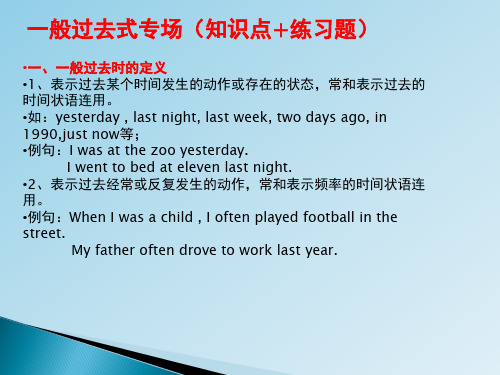
Where did he play basketball at school?
moved smile--smiled; hope--hoped. 注意:ie结尾动词,直接加d: died;tied.
3)以一个元音字母加一个辅音字母结尾的重读闭音节动词,先双写结尾 的辅音字母,再加-ed。如:stop—stopped, trip—tripped ; 4)以辅音字母加y结尾的动词,先把y变成i,再加-ed。如:study— studied, carry—carried, hurry—hurried, marry—married worried; studied.
三、选择
( A )1、—Did you help me clean my room? —Yes , I _____
A. did
B . do
C . does
( C )2、—What did Lisa do yesterday?
—She ____ to music.
A . listens B. listen C. listened
Thank You
二、一般过去时的构成 1、在某个时间里存在的状态 主语+be的过去式(was,were)+其他。 Be的过去式的用法:was用于我(I)、他(he)、她(she)、它(it) 复数(we、you、they)全部都用were。 例句:I was at home yesterday.
- 1、下载文档前请自行甄别文档内容的完整性,平台不提供额外的编辑、内容补充、找答案等附加服务。
- 2、"仅部分预览"的文档,不可在线预览部分如存在完整性等问题,可反馈申请退款(可完整预览的文档不适用该条件!)。
- 3、如文档侵犯您的权益,请联系客服反馈,我们会尽快为您处理(人工客服工作时间:9:00-18:30)。
He studied English in America in 2012. 注意:元音字母+y结尾,直接加ed. play---played
规则变化:
4.末尾只有一个辅音字母的重读闭音 节词,先双写辅音末尾的辅音字母, 再加ed.
stop---stopped plan---planned
翻译: 他在我面前停了下来。
He stopped in front of me.
不规则变化:
也就是说不能在词尾加ed. 常见不规则动词:
am/is--- was are----were
have/has----had eat----ate
see----saw
buy----boy----said
bring----brought begin----began stand----stood put----put feel----felt break---broke
sit----sat
do---did teach----taught
run---ran
know---knew hear---heard tell---told get---got become---became ride---rode
六年级英语过去式
--Fred
什么叫一般过去时? 用来陈述我们说话之前发生的事 情叫一般过去时。
She went to the hospital this morning. 今天早上她去医院了。
I was ten years old when she left. 她离开时我十岁。
一般过去时要把动词变成过去式。
4. Is_t_a_y_e_d_(stay) at home last weekend.
5. I _d__ra_n_k__(drink) some tea last night.
6.She _w_a_s__(be) six when her mother died.
6.We _h_a_d____(have) a good time last holiday.
变一般疑问句
I went to the zoo last week. Did you go to the zoo last week? I stayed at home last night. Did you stay at home last night? I watched TV yesterday. Did you watch TV yesterday?
写出下列单词的过去式
go----went do--- did is---- was hope---- hoped stay---- stayed
swim----swam run--- ran
wash----washed read--- read visit---- visited clean--- cleaned study---- studiedwatch--- watched live---- lived read--- read feel---- felt sleep--- slept are--- were write-- wrote
翻译: 昨天下午我和朋友一起踢足球。 I played football with my friends yesterday afternoon.
英语句子顺序:
某个人
(主语)
做
(谓语动词)
某一件事
(宾语)
怎么做(方式)
(方式状语)
在哪里
(地点状语)
什么时候
(时间状语)
昨天晚上他在家里认真地做作业。 He did homework carefully at home last night. Last night he did homework carefully at home.
parents last weekend.
5. 两天前我看了一本无聊的书。
I read a boring book two days ago.
用单词正确形式填空 1. What_d_i_d_. (do) you do last night? 2.I __c_le_a_n_e_d_(clean) my room and _w__at_c_h_e_d_(watch) TV last weekend. 3. How__w_a_s__(be) your weekend?
1.我上个星期就坐这里。
I sat here last week.
2.昨天晚上我在家看电视。
I watched TV at home last night.
3. 上个周末我洗衣服了。
I washed my clothes last weekend.
4. 上个周末他和父母看了一部有趣的电影。
He saw an interesting film with his
规则变化:
2.以不发音的字母e结尾,直接加d
hope---hoped live---lived use---used like---liked
翻译: 五年前我在贵阳和父母住一起。 I lived in Guiyang with my parents five years ago.
规则变化:
3.以辅音字母+y结尾,先变y为i,再加ed. study---studied carry---carried worry---worried
look---looked use---used see---saw
时间用过去时间。 last night/year/month/week… Three years ago; two weeks ago…
2013/2009/1999/2014…
动词过去式变化:
规则变化:
1. 直接在末尾加 ed
stay---stayed wash---washed clean---cleaned watch---watched
catch----caught go---went
write----wrote drive----drove drink----drank
sleep---slept sweep---swept pay---paid
give----gave
come----came take----took
swim----swam
